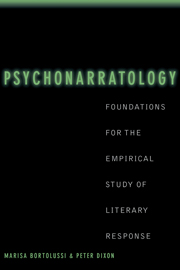Book contents
1 - Introduction
Published online by Cambridge University Press: 28 July 2009
Summary
“fear is a failure of the imagination”
T. Findlay, Not Wanted on the VoyageThe Study of Narrative
Narratives in one form or another permeate virtually all aspects of our society and social experience. Narrative forms are found not only in the context of literature but also in the recollection of life events, in historical documents and textbooks, in scientific explanations of data, in political speeches, and in day-to-day conversation (Nash, 1994: xi). In fact, narrative discourse seems to be intrinsic to our ability to use language to explain and interpret the world around us, and there is an abundance of evidence suggesting that the manner in which we process narrative affects our cognitive and linguistic behavior in general. Therefore, understanding the dynamics of narrative can be instrumental in gaining knowledge about how the mind works (Chafe, 1990); how individuals behave in social and personal relationships (Tannen, 1982, 1984); how they acquire and organize knowledge and analyze themselves, the world, and others around them (Potter & Wetherell, 1987; Lamarque, 1990); how they shape their experience of reality (White, 1981; Ricoeur, 1983); and how they are affected by cultural codes and norms.
Because of narrative's ubiquitous nature and its perceived importance in all aspects of social life, it is not surprising that narrative “is no longer the private province of specialists in literature (as if it ever should have been)” (Nash, 1994:xi), and that it is now studied across a wide range of disciplines, such as literary studies, cultural studies, linguistics, discourse processing, cognitive psychology, social psychology, psycholinguistics, cognitive linguistics, artificial intelligence, and, as Nash points out, ethno-methodology and critical legal studies (Wieder, 1974).
- Type
- Chapter
- Information
- PsychonarratologyFoundations for the Empirical Study of Literary Response, pp. 1 - 33Publisher: Cambridge University PressPrint publication year: 2002

